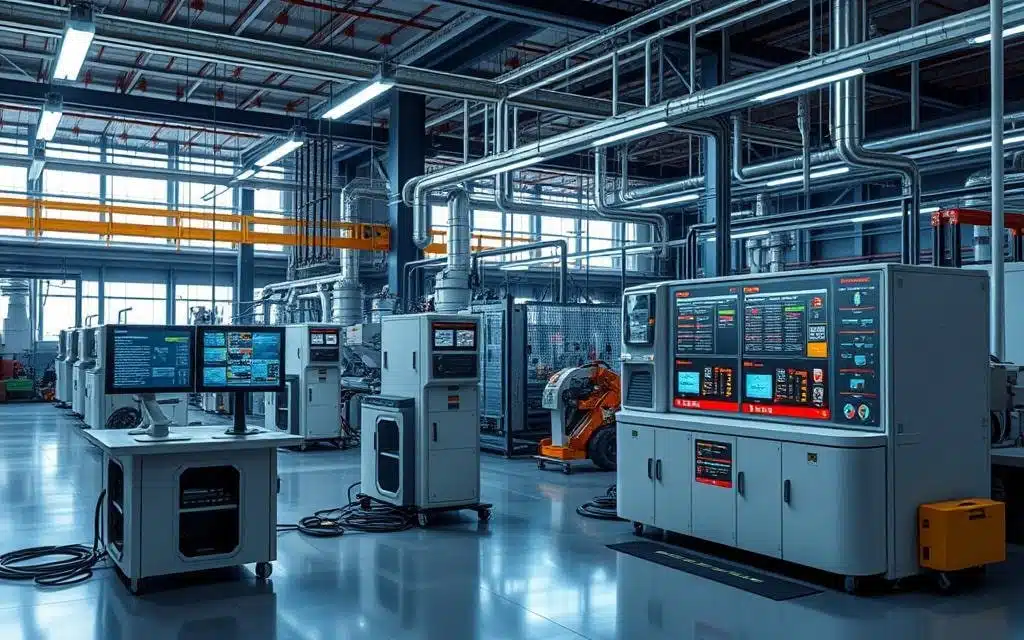In today’s push for operational excellence, the importance & benefits of ICSS in industrial operations is undeniable. ICSS plays a vital role in managing critical infrastructure, ensuring the safety and efficiency of essential sectors such as energy, water treatment, and chemical manufacturing. Integrated Control and Safety Systems (ICSS) blend control and safety mechanisms into a single platform. This integration significantly enhances industrial operations with ICSS. They are not just about maintaining pace but are instrumental in driving industries toward superior efficiency, reliability, and safety standards.
Discover how ICSS is upgrading industries while reducing operational costs. Automation cuts down on human errors, and predictive maintenance prevents equipment failures before they escalate. Through this proactive integration of technology, operations become smoother and outputs more exceptional.
Across various sectors, from refineries to manufacturing plants, ICSS is transforming the way industries operate. By leveraging the industrial control systems benefits, organizations are not just enhancing productivity. They are also establishing a competitive edge in a landscape filled with both challenges and opportunities.

Key Takeaways
ICSS streamlines industrial operations to promote efficiency and safety.
Compliance with industry standards like OSHA and NFPA becomes more manageable via ICSS.
Return on investment is maximized through reduced maintenance time and energy optimizations.
With ICSS, incident response is swift, cutting down on injuries and operational disruptions.
Real-time data analytics embedded in ICSS enhance decision-making processes.
Organizational competitiveness is sharpened by implementing sophisticated ICSS.
ICSS’s predictive maintenance capabilities improve equipment longevity and performance.
The centralized supervisory control loop in ICSS connects multiple local production systems, enhancing real-time decision-making and operational reliability.
Understanding Industrial Control Systems
Definition and Types of Industrial Control Systems
Industrial Control Systems (ICS) are sophisticated networks of hardware and software designed to manage and regulate industrial processes. These systems act as the digital brains behind the automation and control of various machinery and systems within industries. By integrating control devices, communication protocols, and human-machine interfaces, ICS enable centralized or distributed control of equipment, ensuring seamless and efficient operations.
Distributed Control Systems (DCS)
Distributed Control Systems (DCS) are a specialized type of ICS that coordinate and regulate processes across multiple locations. Comprising a network of controllers, DCS enable real-time monitoring and control of complex industrial operations. Widely employed in sectors such as chemical and petrochemical industries, DCS enhance efficiency by providing a unified platform for comprehensive process oversight. By distributing control functions across various nodes, DCS ensure redundancy and reliability, making them indispensable in critical industrial environments.
Components of Industrial Control Systems
Hardware Components
Industrial Control Systems (ICS) are composed of several key hardware components, each playing a crucial role in the overall functioning of the system. These components work together to monitor, control, and manage industrial processes, ensuring efficiency, safety, and reliability.
Programmable Logic Controllers (PLC): PLCs are robust industrial computers designed to automate control processes in manufacturing and industrial settings. These devices excel in real-time control of machinery and processes, executing programmed instructions to monitor inputs and trigger specific outputs.
Remote Terminal Units (RTU): RTUs are vital components in industrial control systems, tasked with collecting and transmitting data from remote locations. These units serve as the bridge between sensors, equipment, and the central control system, ensuring seamless communication.
Intelligent Electronic Devices (IED): IEDs are specialized components in industrial control systems designed for specific monitoring and control tasks. These devices integrate advanced computing capabilities to process and analyze data in real-time, enabling precise control and automation.
Human-Machine Interfaces (HMI): HMIs serve as the interactive bridge between humans and industrial machines, facilitating intuitive communication and control. Through graphical displays and touchscreens, HMIs allow operators to monitor processes, receive real-time data, and make informed decisions.
Sensors and Actuators: Sensors and actuators are essential hardware components that interact with the physical environment, providing real-time data and executing control actions. These devices are critical in maintaining the efficiency and safety of industrial processes.
These hardware components work in conjunction with software and communication protocols to form a comprehensive industrial control system, enabling efficient and reliable management of industrial processes.
Unveiling the Core Benefits of ICSS in Industrial Automation
The adoption of Integrated Control and Safety Systems (ICSS) marks a significant milestone in enhancing efficiency across various sectors. By integrating critical control and safety features, these systems deliver a robust solution for industrial automation. A distributed control system (DCS) is integral to ICSS, providing real-time data integration and control to enhance process stability and optimize operations. They transform operations, making them more efficient, safe, and compliant. In this exploration, we delve into how ICSS fosters an improved industrial environment.
Streamlined Control Processes
Programmable Logic Controllers (PLCs) and Human Machine Interfaces (HMIs) stand at the forefront of industrial automation. They grant precise control and instantaneous responsiveness, essential for attaining efficiency with ICSS. The centralized supervisory control loop within ICSS connects various local production systems, enabling efficient monitoring and control. HMIs provide user-friendly interfaces and advanced visualization, boosting both operability and safety. By merging these components, ICSS simplifies control processes. It heightens responsiveness while drastically reducing manual errors.

Predictive Maintenance for Pre-emptive Action
ICSS leverages advanced analytics to forecast potential system failures before they worsen. This foresight is critical for minimizing disruptions and ensuring smooth, ongoing operations. By proactively managing wear and tear, ICSS maintains machinery integrity. It boosts efficiency with ICSS, securing the reliability and durability of machines.
Improved Safety & Compliance
ICSS frameworks incorporate strict safety protocols, significantly elevating onsite safety levels. ICSS is crucial for safeguarding critical infrastructure, ensuring the safety and reliability of essential sectors such as energy, water treatment, and chemical manufacturing. Featuring emergency shutdowns and detection systems, they align with regulations like OSHA and NFPA. By meeting all necessary safety standards, ICSS safeguards personnel and infrastructure alike. The comprehensive safety measures within ICSS offer industrial automation benefits that underscore security and confidence in operations.
For a deeper insight into ICSS and its transformative impact, visit our detailed guide on Integrated Control and Safety Systems.
Integration & Safety Synergy in Supervisory Control
In examining the benefits of ICSS in both oil and gas and manufacturing, it’s critical to grasp how operational technology (OT) and information technology (IT) converge. A distributed control system (DCS) within ICSS ensures real-time monitoring and control, enhancing safety and operational efficiency. The effective merging of these systems elevates safety and boosts operational efficiency. Yet, this blending poses unique challenges that must be overcome to fully unlock these advantages.
OT systems, key in manufacturing and energy, traditionally function separate from IT systems. These systems often lack strong authentication and detailed logging, presenting security risks. When IT, with its emphasis on data and network security, merges with OT, these vulnerabilities can become more pronounced. This merger complicates ICSS’s application in manufacturing and oil and gas industries.
Merging ICSS into manufacturing setups and oil and gas operations strengthens safety with real-time monitoring and advanced alarming capabilities. This combination raises safety levels while also boosting reliability and productivity. Challenges in merging include cultural divides between IT and OT teams, differing priorities, and insufficient cross-training. Additional concerns include enlarged attack surfaces and legacy technology compatibility issues. To address these, strategies should include:
Adopting threat modeling.
Providing cross-training for IT and OT teams.
Implementing secure backup solutions.
Ensuring secure remote access and thorough asset management.
The table below contrasts security strategies before and after IT-OT integration, showcasing significant security improvements:
| Security Parameter | Pre-Integration | Post-Integration |
|---|---|---|
| Network Segmentation | Limited | Enhanced with VLANs and micro-segmentation |
| Data Encryption | Seldom | Widespread and Enhanced |
| Threat Detection | Basic | Real-time with continuous monitoring |
| Access Control | Minimal | Strict with Role-Based Access Control |
| Remote Access | Unsecured | Secure and Traceable |

The integration of ICSS in the manufacturing and oil and gas sectors reflects an essential shift in industrial security philosophy. Overcoming its challenges requires deep insights into both IT and OT territories and a dedication to constant enhancement and flexibility.
This synergy is indeed paving the way toward a safer, more efficient future in industry.
The Role of Real-Time Monitoring in Output Enhancement
Industries are increasingly integrating real-time monitoring with ICSS into controlling industrial operations. This cutting-edge method boosts operational efficiency and is vital for enhancing output in various fields.
ICSS’s efficient data management improves industrial automation and enhances both safety and reliability. In critical sectors like chemicals, oil and gas, and energy production, accurate control and continuous oversight are crucial. The ability of real-time monitoring with ICSS for instant adjustments helps operations proceed smoothly, avoiding unplanned stops.
Proactive Decision-Making
Operators gain immediate insights from real-time data, a principal ICSS benefit. This quick access to information aids in preventing problems and refining the performance of industrial setups. Through swift analysis of data from Programmable Logic Controllers (PLCs) and Human-Machine Interfaces (HMIs), disruptions to production are reduced.
Dynamic Process Adjustment
The delivery of instant information enables swift alterations in manufacturing, promoting operational adaptability. Distributed Control Systems (DCS) and Supervisory Control and Data Acquisition (SCADA) systems underline ICSS’s key role in adjusting production effortlessly. These systems are designed to fully leverage real-time monitoring to enhance controlling industrial operations, keeping productivity at its peak.
The integration of different Intelligent Electronic Devices (IEDs) further empowers high-functioning, efficiently managed environments, thanks to ICSS:
| Device Type | Role in Real-Time Monitoring | Impact on Industrial Operations |
|---|---|---|
| Programmable Logic Controllers (PLCs) | Automate control processes | Enhances efficiency and precision |
| Remote Terminal Units (RTUs) | Transmission of data from remote sensors | Facilitates communication and data integrity |
| Human-Machine Interfaces (HMIs) | Interface between human operators and machines | Improves user experience and operational control |
| Programmable Automation Controllers (PACs) | Combines advanced computation with reliability | Offers enhanced adaptability and processing power |
| Supervisory Systems (SCADA) | Centralized monitoring across multiple sites | Boosts operational efficiency and reliability |
By adopting ICSS benefits and competent real-time monitoring, industries are moving toward significant improvements in controlling industrial operations. This evolution promises a more unified, effective, and secure production landscape.
Driving Down Costs with ICSS Efficiency
ICSS cost savings are critical, achieved through optimizing with ICSS. These systems lower maintenance downtime, reducing operating costs. A robust ICSS ROI emerges from improved efficiency and reliability.
The HART protocol and ICSS advancements have revolutionized financial gains. They enable smarter maintenance and energy optimization. Condition-based maintenance, supported by intelligent diagnostics, allows for preemptive actions. This reduces the need for traditional, time-consuming methods.
| Feature | Description | Impact on Cost Savings |
|---|---|---|
| Intelligent Field Devices | Provide multiple diagnostics to optimize device functionality and predict maintenance needs. | Reduces unnecessary maintenance and extends the lifecycle of equipment. |
| Advanced Alarm Management | Facilitates early detection of potential issues before they escalate into costly problems. | Minimizes downtime and mitigates risk of expensive repairs and operations halt. |
| Redundant, Scalable Architecture | Ensures system availability and reliability, reducing the likelihood of system-wide failures. | Decreases incidents that lead to large-scale operational disruptions and financial loss. |
| Digital Offshore Solutions | Supports optimizing with ICSS by enabling remote operations and maintenance. | Enhances resource deployment efficiency, slashing costs associated with on-site teams. |

For maximal ICSS cost savings, industries must fully integrate and utilize these systems. Digital transformation, centered around ICSS, improves compliance and boosts operational efficiency. ICSS’s broad capabilities, from predictive maintenance to security management, offer significant ICSS ROI.
Siemens Energy leads in modernizing offshore production, focusing on Electrification, Automation, and Digitalization. Tools like Omnivise for Offshore enhance production efficiency and asset management. Thus, optimizing with ICSS is both compelling and essential.
Upgrading Your System: ICSS Compatibility and Integration
As industries continue to evolve, integrating advanced systems for ICSS becomes crucial. Upgrading your system with our approach doesn’t mean starting from scratch. It enhances your existing infrastructure’s capabilities. We focus on compatibility to lessen the impact of system transitions.
Minimizing Downtime During Transition
Minimizing downtime is key in our ICSS transition plans. Solutions like Rockwell Automation’s ASEM and FactoryTalk View ensure upgrades are quick and efficient. Your operations remain uninterrupted. This approach preserves productivity and prevents financial losses during transitions. Discover more about our integration services at Integrated Control and Safety Systems.
Customized Solutions for Diverse Industrial Needs
Every industry’s needs are different, and our ICSS scalability reflects this. We provide custom integration solutions, whether integrating with old systems or new digital technologies. Designed to serve various sectors, our solutions enhance functionality, boost efficiency, and promote sustainability.
| Feature | Benefits |
|---|---|
| FactoryTalk View Software | Reduces application creation time, streamlines setup processes |
| ASEM Thin Clients | Quick setup, replacement ease, minimizes downtime |
| FactoryTalk Analytics Edge Gateway | Facilitates IoT Edge applications, enhances data analytics capabilities |
| MultiSession Support | Allows multiple client devices, cost-efficient station setups |

Our pledge is to enhance operations and ease transitions via seamless ICSS integration. By offering adaptive, scalable solutions, we ready your business for today and tomorrow. Our focus is operational excellence and strategic value, whether upgrading or installing new systems.
Scalability & Modularity: Future-proofing Your Operations
In today’s industrial automation arena, scalability with ICSS and flexible ICSS solutions stand out as critical for organizations aiming to lead. They not only support growth but adapt effortlessly to evolving operational needs. Our strategy incorporates modular designs for personalized system expansion, safeguarding investments and enhancing flexibility.
Inductive Automation experts highlight the need for systems that expand rapidly, “whenever necessary”. This capability was evident in Chobani’s case study, showing how Ignition by Inductive Automation boosted efficiency, minimized downtime, and facilitated swift projects. Discover more about Ignition here.
Ignition’s adaptable nature underlines a valuable ecosystem for operations. It supports wide-ranging third-party integrations and allows adding servers as needed, embodying scalability with ICSS.
Crescend Technologies recently introduced the first-ever 50-kilowatt solid-state microwave generator, highlighting modularity’s importance in technological progress. This breakthrough promises remarkable efficiency and showcases the modular approach needed for future-ready systems. Learn more about Crescend’s innovations detailed here.
The concept of flexible ICSS solutions extends beyond improving existing systems. It’s vital for integrating Industry 4.0 and advancing digital transformations. Platforms like Ignition enhance OT platforms, enabling effective use of cloud technologies and overcoming traditional challenges for substantial digital shifts.

Our dedication to scalability with ICSS goes beyond mere growth. It inspires innovation, speeds up adaptation to tech changes, and ensures readiness for new market trends. By adopting flexible ICSS solutions, organizations are prepared not just for current needs but for a sustainable and thriving future.
Keeping Up With Regulations: Compliance Made Easier with ICSS
Compliance mandates often set a security practices baseline in industrial operations. The integration of digital tools, data analytics, and automation in ICSS streamlines this process. It enhances efficiency and risk management within governance, risk, and compliance (GRC) frameworks. Recognizing the need to stay ahead of evolving governance frameworks and industry regulations, a robust system like ICSS is essential. It seamlessly adapts to new threat environments.
Adopting ICSS offers benefits that extend beyond operational efficiency, ensuring full compliance with industry-specific regulations such as ISO 27001 and IEC 63452. Compliance with ICS regulations boosts security posture, mitigating risks linked to growing cybersecurity threats. This is crucial in sectors like transportation, medical, and energy, where the impact of regulations varies. For a detailed insight into how ICSS aids various sectors, visit SCADA System Uses.
Furthermore, ICSS compliance allows organizations to develop a comprehensive asset inventory. This is vital for identifying real ICS security risks. Leveraging technologies like SIEM and specialized OT platforms, ICSS improves threat detection in industrial operations. It ensures that every aspect of operations meets strict compliance requirements.
| Industry-Specific Standards | Key Benefits of Compliance |
|---|---|
| ISO 27001, IEC 62443 | Structured approaches for security implementation |
| IEC 63452, NIST SP 800-82 | Enhanced security posture against cyber threats |
| General Industry Regulations | Prevents penalties and loss of licensing |
To stay ahead, industries must prioritize continuous compliance. Tailoring governance to specific mission requirements enhances security effectiveness. It also positions ICSS as vital for modern industrial operations. Regular audits and systematic security checks through ICSS platforms ensure prompt identification and mitigation of vulnerabilities. This effectively reduces potential risks posed by cyber threats.

ICSS supports firms in meeting regulatory demands and arms organizations with necessary tools for accurate documentation, reporting, and implementing safety procedures. These processes are crucial for maintaining legal and financial integrity. Hence, making ICSS an invaluable tool for modern industrial operations striving to keep up with industry regulations and ICSS compliance benefits.
How ICSS Facilitates Enhanced Incident Response
In the interconnected world of industry, Industrial Control Systems Security (ICSS) is crucial for protecting critical infrastructures. ICSS is crucial for protecting critical infrastructure, ensuring the safety and reliability of essential sectors such as energy, water treatment, and chemical manufacturing. It ensures swift response to incidents. The essence of this capability lies in how alarms are managed. This is vital for detecting threats and coordinating responses. With precise alarm management in ICSS, companies can reduce risks in diverse operations like power and water treatment.
Automated Emergency Protocols
Automation is key, not just for its speed but for its precision and dependability. In emergencies, ICSS shortens response times and acts decisively without hesitation. It sets up automatic actions for when certain conditions arise. This prevents potential dangers from becoming real disasters.
Timely Alarms & Warnings
ICSS is essential for timely alarms and warnings. These systems provide instant alerts for immediate action. The core of this is ICSS alarm management. It helps industries keep running smoothly and safeguards assets while lowering safety hazards.
The rise in technology use and IoT devices in industries increases security risks. A strong ICSS framework is needed to handle these challenges. By using advanced ICS security solutions, companies can tackle threats before they affect operations.
Effective incident management protects both people and infrastructure. It also boosts organizational resilience. ICSS allows for rapid response, utilizing AI for threat detection and automating security for complex systems.

ICSS incorporates machine learning and data analytics to foresee and manage anomalies early. Following Incident Response Plans for ICS/OT is critical. These plans cover everything from preparation to recovery and learning from incidents, ensuring thorough event management.
| Year | Event | Impact |
|---|---|---|
| 2010 | Stuxnet Attack | Highlighted vulnerabilities in ICS |
| 2021-2023 | Cyber Intrusions in Indian Power Grid | Emphasized advanced persistent threats in critical sectors |
| Multiple Incidents | Kinetic and Cyber Attacks in Ukraine | Showcased dual-threat dynamics in industrial sectors |
With improved ICSS alarm management and speedy incident responses, we can handle the complexities of today’s industrial operations better. This ensures the safety, efficiency, and integrity of all processes.
Smarter Resource Management for Sustainable Operations
Today’s industrial world demands not just smarter resource management, but a strategy that integrates sustainability. At its heart, resource optimization with ICSS (Integrated Control and Safety Systems) bridges productivity with eco-friendly practices. This integration leverages cutting-edge control systems and new tech. Consequently, industries can elevate energy efficiency and lessen waste, promoting profitability and environmental guardianship.
Industrial control systems have evolved from simple mechanisms to sophisticated digital solutions. These include edge computing, cyber-physical systems, and cloud-based technologies. This evolution propels seamless operations across sectors like manufacturing, energy, and healthcare. It’s a shift that enhances efficiency while trimming down operational costs.
Enhanced safety measures and reduced maintenance costs lead to more sustainable industrial practices.
With ICSS, companies have reported a streamlined workflow, which significantly cuts down energy usage and minimizes waste.
The introduction of AI and Internet of Things (IoT) has revolutionized resource management. These technologies ensure sustainable practices with ICSS while uplifting quality of life. They contribute to safer workplaces and groundbreaking products.
| Technology | Contribution to ICSS | Impact on Sustainability |
|---|---|---|
| AI and Machine Learning | Improves process efficiency and decision-making | Reduces resource waste and enhances energy efficiency |
| IoT Integration | Enables real-time monitoring and control | Optimizes energy use and operational costs |
| Edge Computing | Processes data locally, reducing response times | Lowers carbon footprint by minimizing data transmission |
The trajectory for industrial control systems leans toward deeper tech integration. Emerging tech like blockchain and standardized cybersecurity protocols are in focus. This trend promises improved system interoperability and a stronger commitment to resource optimization with ICSS.

Industries adopting these advances are not just keeping up with tech changes. They’re leading the charge in sustainable development. The Smart Manufacturing 360 Cyber Senate Conference showcases these innovations. It underlines the critical role of ICSS in enhancing resource efficiency and sustainability in the manufacturing sector.
The adoption of modern control systems does more than boost efficiency. It fundamentally shifts the markers of industrial sustainability and environmental accountability.
Unlocking Strategic Advantages: The Competitive Edge Provided by ICSS
Industries are evolving quickly. Gaining an advantage with ICSS (Industrial Control Systems Security) is now essential in manufacturing, energy, and transportation. ICSS boosts operational efficiency, safety, and cuts costs. This marks a pivotal shift in industrial progress.
The modern competitive field demands quality, efficiency, agility, and sustainability. ICSS answers these by incorporating OPC Unified Architecture (UA). This revolutionizes operations with superior security and reliable data exchange. It enables greater interoperability and streamlined procedures, key for global competitiveness.
Integrating protocols like OPC UA in ICSS frameworks allows firms to surpass rigorous industrial demands. These protocols secure data precision and consistency, crucial for efficient operations and decision-making. With OPC UA’s scalability and flexibility, companies remain competitive and prepared for the future.
To illustrate, the table below shows how OPC UA’s features contribute to competitive advantage via ICSS:
| Feature | Description |
|---|---|
| Security Models | Encryption, data signing, and authentication to ensure cybersecurity. |
| Data Handling | Reliable exchange, buffered handling, and redundancy features. |
| Interoperability | Compatible with PLCs, SCADA, MES systems, boosting integrated operations. |
| Advanced Data Types | Supports complex data essential for detailed industrial processes. |
| Event Monitoring | Detailed event management for efficiency and safety. |
By using ICSS with OPC UA, security is reinforced and data reliability enhanced. This expands operational oversight and control. The result is higher product quality, faster production, and improved service. Therefore, ICSS’s transformative effect is fundamental for industries to excel in today’s competitive arena.
Conclusion
Our thorough investigation into Integrated Control and Safety Systems (ICSS) has highlighted their vital role in modern industry. These systems provide a solid technological foundation, allowing sectors like manufacturing and transportation to excel in a digital era. By harmonizing the work of controllers, sensors, and interfaces, ICSS simplify operations. This enhances the core structures of these industries.
Introducing ICSS at different industrial levels boosts operational effectiveness. They also offer a shield against global cybersecurity risks, like BlackSuit ransomware threats. Thanks to advancements like Darktrace’s tech, these systems have stopped serious cyberattacks. They protect both the data integrity and financial assets of industries.
In the complex landscape of current industrial activities, strategically applying ICSS is essential for enduring success. These systems’ smooth integration and instant operation not only improve efficiency and safety but also ensure regulatory compliance. The ongoing adoption and optimization of ICSS are critical. This approach will not only help industries face digital dangers but also place them at the forefront of innovation.
FAQ
What are the main benefits of implementing ICSS in industrial operations?
The primary benefits involve increased efficiency and better outputs. The process controls are more efficient, leading to heightened safety and compliance. Predictive maintenance is also a key advantage. Added to this are real-time monitoring, cost reductions, and optimized expenses, all contributing to significant ROI.
How does ICSS contribute to streamlining control processes?
By minimising manual oversight, ICSS simplifies control and surveillance. This leads to smoother operations and less human error, raising overall efficiency in industrial automation.
Can ICSS have a significant impact on maintenance strategies?
Certainly, ICSS brings predictive maintenance into play. This proactive tactic prevents equipment failures, enhancing reliability and cutting downtime.
What role does ICSS play in ensuring safety and compliance in industrial sectors?
ICSS enhances safety via emergency shutoffs, gas and fire detection, and integrated safety measures. These elements protect personnel and assets while aligning with standards from OSHA and NFPA.
How important is real-time monitoring in enhancing industrial operations?
Real-time insights from ICSS bolster proactive decisions, enabling quick adjustments. This boosts efficiency and productivity in operations.
In what ways can ICSS drive down operational costs?
ICSS slashes costs by trimming maintenance downtime and optimizing energy use. It also reduces the risk of expensive incidents, thus controlling operations and bettering financial results.
What are the benefits of ICSS integration in existing industrial systems?
Seamless integration with minimal disruptions is a major benefit. It offers tailored solutions for various industrial needs and prevents issues during upgrades, ensuring smooth transitions.
How does ICSS support scalability and modularity in industrial operations?
Its scalable, modular solutions let organizations customize and grow their control systems. This adaptability future-proofs operations against market and standard changes.
What advantages does ICSS offer regarding regulatory compliance?
ICSS eases regulatory compliance by weaving in safety protocols and best practices. It supplies tools for documentation, reporting, and safety procedure implementation, fulfilling regulatory needs.
How do ICSS solutions enhance incident response capabilities?
ICSS bolsters incident response through smart alarm management and set emergency plans. This swift, effective response minimizes impacts and risks.
Why is smarter resource management with ICSS important for sustainability?
Optimized energy usage, minimized waste, and lowered environmental impact make operations sustainable. ICSS upholds high efficiency and productivity, promoting sustainability.
How does adopting ICSS technology give industries a competitive edge?
ICSS enhances operational efficiency, reinforces safety, cuts costs, and encourages sustainability. It endows industries with a strategic edge, leading to superior product quality, reduced lead times, and enhanced customer service.







2 thoughts on “Benefits of ICSS in Industrial Operations: Enhance Output”
Comments are closed.